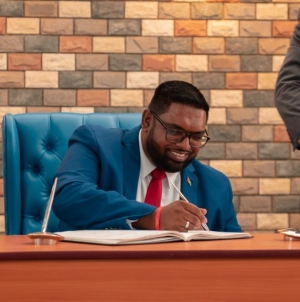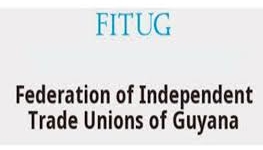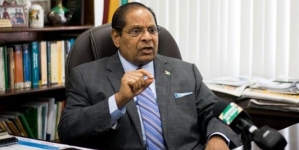Submission on behalf small parties
By Ralph Ramkarran S.C. and Attorney, Timothy Jonas
SUBMISSIONS:
Article 177(4) requires a President to be elected before the jurisdiction which it confers can be invoked but the constitutional process for the election of a President has not been completed.
- The Motion herein provides “that this will be moved pursuant to its Original Constitutional Jurisdiction conferred by Article 177(4) of the Constitution of Guyana.”
- Article 177(4) of the Constitution states: “The Court shall have exclusive jurisdiction to hear and determine any question as to the validity of an election of a President in so far as that question depends upon the qualification of any person for election or the interpretation of this Constitution; and any decision of that Court under this paragraph shall be final.”
- Since the Motion has been filed pursuant to the jurisdiction conferred by Article 177(4) it is to be assumed that the Motion would be dealing with the qualification of a person who has been elected President or any interpretation of the Constitution as regards the qualification of that person.
- The words “as to the validity of an election of a President” in Article 177(4), quoted above, can only mean that in order to invoke the Article the President must already have been elected.
- Article 177(2)(b) sets out precisely when a President is elected. It states: “Where (a)….(b) there are two or more presidential candidates, if more votes are cast in favour of the list in which a person is designated as Presidential Candidate than in favour of any other list, that Presidential shall be deemed to be elected as President and shall be so declared by the Chairman of the Elections Commission acting only in accordance with the advice of the Chief Election Officer, after such advice has been tendered to the Elections Commission at a duly constituted meeting.”
- The constitutional process for the elections of the President has not yet been completed. The advice of the Chief Election Officer has not been proffered to the Elections Commission and the Chairman of the Elections Commission has made no declaration.
- By section 96(1) of the Representation of the People Act (“ROPA”) after calculating the valid votes cast on the basis of the votes counted and the information furnished by returning officers under section 84(11), the Chief Election Officer shall ascertain the results of the election in accordance with sections 97 and 98.
- By section 96(2) The Chief Election Officer shall prepare a report in manual and electronic form which shall be the basis for the Commission to declare and publish the results under section 99.
- Under section 99, not later than 15 days after the election the Commission shall publicly declare the results of the election and shall cause to be published in the Gazette a notification thereof.
10. The use of the word “shall” in these provisions suggest that these are compulsory procedures. - The Recount Order does not affect the duties of the Chief Election Officer under section 96(2) to the effect that a report must be prepared or the duty of the Commission under section 99 to publicly declare and publish the results of the election.
- By clause 9 of the Recount Order the Statements of Recount are to be put in a matrix. Under clause 11 the signed matrix are to be given to a number of persons including the Chairman and Commissioners. By clause 12 the matrices for the recount of the 10 electoral districts are to be tabulated by the Chief Election officer and submitted in a report, together with a summary of the observation reports for each district to the Commission. By clause 14, the Commission, after deliberating on the Chief Election Officer’s report, shall determine whether it would request the Chief Election Officer to use the data compiled in accordance with clause 11 as the basis of the submission of a report under section 96 of ROPA.
- The Amended Recount Order does not materially affect the duties and responsibilities of the Chief Election Officer.
- The Chief Election Officer duly submitted a report in which he exceeded his mandate beyond the requirements of the Recount Order and pronounced on the credibility of the votes cast in the elections.
- The Chair of the Commission has since instructed the Chief Election Officer to make a report on the results of the election or before 1.00 pm on June 18, 2020, using the results of the recount. The Chief Election Officer has not complied with the instructions of the Chair of the Commission.
- In the circumstances the process of the election of the President has not yet been elected and a new President has not been sworn in.
17. It is submitted, therefore that the Court of Appeal has no jurisdiction over this matter.
Article 177(4) confers jurisdiction to question the qualification of the person elected as President.
- The qualification of the President is set out at Article 90 of the Constitution. The Article states: “(1) A person shall be qualified for election as President and shall not be so qualified unless he or she (a) is a citizen of Guyana and is Guyanese by birth or parentage as defined in articles 43 and 44; (b) is residing in Guyana on the date of nomination for election and was continuously residing therein for a period of seven years immediately before that date; and (c) is otherwise qualified to be elected as a member of the National Assembly.”
- Article 53 provides for the qualification for election as a member of the National Assembly which must be satisfied by a candidate for President. It states: “Subject to article 155 (which relates to allegiance, insanity and other matters) a person shall be qualified for election as a member of the National Assembly if, and shall not be so qualified unless, he or she (a) is a citizen of Guyana of the age of eighteen or upwards; and (b) is able to speak and, unless incapacitated by blindness or other physical cause, to read the English language with a degree of proficiency sufficient to enable him or her to take an active part in the proceedings of the Assembly.”
- The above article refers to Article 155 as providing some qualifications. This is a long article but it excludes persons certified to be insane or adjudged to be of unsound mind, is under sentence of death or serving a sentence of more than six months imprisonment or is under such a sentence, is a judge or a member of commissions established under the Constitution.
- None of these issues relating to the qualification of the President, assuming that he has already been appointed, has been raised in the Motion and, therefore, this Court has no jurisdiction over this matter.
The interpretation of Article 177(4) in the case of Re Eusi Kwayana’s Application (1980) 20 WIR 130.
- In the case of Re Eusi Kwayana’s Application (1980) 20 WIR 130, Mr. Eusi Kwayana challenged the validity of the oath taken by then Prime Minister Forbes Burnham on 6th October, 1980, under a transitional provision, section 10(1) of the Co-operative Republic of Guyana Act 1980, by which he assumed the office of ‘transitional’ President until elections on 15th December, 1980. The then Prime Minister had added the words “And I do so swear so help me God,” which were not contained in the oath set out in the Schedule to Article 232 in the new Constitution.
- The application was made by Mr. Kwayana under Article 177(4) of the Constitution, which fell for interpretation in the Court of Appeal. He argued that the assumption of office of President by the Prime Minister was null and void because of his addition of the above words.
- Section 10(1) provided: “The person who immediately before the appointed day holds the office of Prime Minister under the existing Constitution shall, subject to the provisions of article 97 of the Constitution (relating to the taking of an oath by the President), assume office as President of the Co-operative Republic of Guyana that day as if he had been elected thereto in pursuance of the provisions of the Constitution and shall, unless he sooner dies or resigns or unless he ceases to hold office by virtue of Article 93 and 94 of the Constitution, continue in office until the person elected President in the next following Presidential election held for the purposes of Article 91 of the Constitution assumes office.”
- The Court unanimously found that there was no election of a President but merely an assumption of office of President under section 10(1). As Jhappan J.A. said: “A distinction must be drawn between the assumption of office of President and an election to the office of President. Article makes provision for the election of the President. In this article the assumption of office follows after the process of election is completed.”
- Referring to Article 177(4) R.H. Luckhoo J. said: “It is not in doubt that words are to be construed in the contexts in which they are found. The subject matter of the jurisdiction is clear. It has to do with the validity of an election of a President. Article 177 follows immediately under Title 4 of Part 2 of the Constitution and is headed ‘The President’, the marginal note thereof being ‘Election of President.’ The provisions deal with the machinery for election of a President under the Constitution. Paragraph (4) is concerned solely with the court’s jurisdiction on a question as to the validity of election of a President under that machinery. Further, the Court’s jurisdiction is circumscribed. It is limited to questions as to the validity of an election of a President in so far as such questions depend (a) upon the qualification of any person for election, or (b) upon the interpretation of the Constitution. The qualification requirements are to be found in Article 90 and need not be set out as they are not pertinent to the matter in hand. I am unable to find anything in the wording of para. (4) construed in the context of the whole scheme of Title 4 Part 2 of the Constitution to warrant jurisdictional extension to a matter falling within the ambit of section 10(1) of the Act.”
- As briefly set out by R. H. Luckhoo J.A., the Attorney General, Dr. Mohamed Shahabudeen argued: “The Attorney General therefore urged the Court to find that its competence under art 177(4) to hear and determine matters was restricted to: (a) questions as to the validity of the election as a President on a ground affecting the qualification of any person for election under the election procedure set out in the provisions of the Constitution itself, the only qualification requirements being found in art 90; and (b) questions as to the validity of an election of a President where those questions where those questions involved the interpretation of the Constitution (not the Act.)
The interpretation of the words “or the interpretation of this Constitution” applies to the issue of the qualification of a person elected as President and not to the issues raised in the Motion and the Affidavit. - The Motion seeks to locate the matter within the jurisdiction of Article 177(4) of the Constitution by seeking in paragraph (b) by seeking an order that there be an interpretation of the words “more votes are cast” in Article 177(2)(b) of the Constitution.
- Article 177(2)(b) states: “Where (a)….(b) there are two or more presidential candidates, if more votes are cast in favour of the list in which a person is designated as Presidential Candidate than in favour of any other list, that Presidential shall be deemed to be elected as President and shall be so declared by the Chairman of the Elections Commission acting only in accordance with the advice of the Chief Election Officer, after such advice has been tendered to the Elections Commission at a duly constituted meeting.”
- There is clearly no difficulty in construing the meaning of “more votes are cast.” It is therefore submitted that the introduction of paragraph (b) of the Motion for an interpretation of the above words is merely for the objective of locating the Motion within the jurisdiction of Article 177(4) and of the Court of Appeal.
- The submissions of the Attorney General in the above case of Re Eusi Kwayana’s Application were upheld. He submitted that “the interpretation of the Constitution” relate to the “validity of an election of a President.” (See paragraph 34 above).
- When R. H. Luckhoo J. A. that he found nothing in Article 177(4) to warrant jurisdictional extension to section 10(1), he was in effect agreeing with the Attorney General’s interpretation as to the interpretation of the words “the interpretation of the Constitution”, namely, that they are limited to issues relating to the qualification of the person elected as President.
33. It is the High Court that has jurisdiction over constitutional matters as part of its wider, original jurisdiction. Section 18 of the High Court Act confirms this by providing that: “Subject to any written law, every action and proceeding and all business arising therefrom shall, so far as is practicable and convenient, be heard, determined, and disposed of before a single judge, and all proceedings in an action subsequent to the hearing or trial and down to and including the final judgment or order, except any proceeding on appeal, shall, so far as is practicable and convenient, be had and taken before the judge before whom the trail or hearing took place. - Article 133 of the Constitution further confirms this by providing: “An appeal to the Court of Appeal shall lie as of right from decisions of the High Court in the following cases, that is to say (a) final decisions in any civil or criminal proceedings on questions as to the interpretation of this Constitution…”
- The history of constitutional law in Guyana confirms that it is the High Court that has jurisdiction over questions relating to the interpretation of the Constitution. As above stated, the Court of Appeal has an appellate jurisdiction.
- Therefore, where the Court of Appeal has been given an original jurisdiction, that original jurisdiction cannot be at large to clash with and cause confusion in the administration of justice.
- Of necessity, therefore, the words “or the interpretation of this Constitution” have to be construed as limited to the issue of the qualification of a person elected as President.
- The Civil Procedure Rules recognizes that the High Court has jurisdiction over constitutional matters. Form 4 C of the Civil Procedure Forms – Information For Court Use – provides for “Proceedings for Relief Under the Constitution” as a proceeding.
The Affidavit discloses no facts or evidence that brings this matter within the ambit of Article 177(4), that is to say, that an election of a President has taken place to finality and that the qualification of the President is challenged.
- There is no need to analyse the Affidavit because nowhere among its 35 paragraphs is there an assertion that the elections have been concluded or that Article 90 has been violated by any candidate.
- It is therefore submitted that the Court of Appeal has no jurisdiction over this matter.
enumerated.”70 Thus, an exemption from arbitration for “contracts of employment of seamen, railroad transported goods and materials were to be exempted.71 At times, however, discerning commonalities among particulars to guide interpretation of the general is not so straightforward.72






















